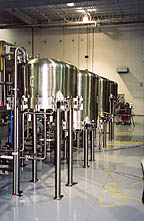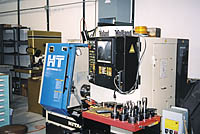
Holland started out as a classic distributor and its core business is still in the buying and reselling of sanitary, or hygienic, pumps, valves and fittings to the food, pharmaceutical and health care industries. The company has since added fabrication of turnkey process systems to its repertoire.
This equipment segment grew out of the creation of custom components and sub-assemblies. When a customer needs a component Holland doesn't have, its people don't wring their hands with excuses, buts and maybes. They figure out how to make it and get a welder to do it.
This can-do attitude started with a one-man fabrication shop. And this evolved into today's business segment of developing modular systems for the biopharmaceutical industry. Yet, Holland still operates as a distributor. Depending on the type of project, it sells to mechanical contractors or to end users, and does not do any installation.
While there are synergies between the two company branches, there are also distinctions. Its distribution remains on a local level while the manufacturing is for customers around the world.
Over the years, it has adopted a mission centered around quality and customer service that's allowed the company to distinguish itself in an industry that's already a narrow business.
“There's nobody exactly like us,” says Dave Cheney, vice president of sales and marketing.
Cheney, a 20-year veteran of the high-purity industry, is part owner of the company following a management team buyout of recently retired CEO Colin Haase. Cheney heads up the distribution side of the business.

Quality Control
This is a company that sees fit to do spectroscopic material checks on items that have already been analyzed by the supplier. Holland also utilizes high-tech borescope technology that peers inside pipes and maintains its own fluid-testing laboratory. These are things you expect to find in a billion-dollar company. But Holland Applied Technologies does this with just 70 employees. Size clearly does not equate with sophistication.The company's factory floors are shiny and dirt-free - nearly immaculate. That's because the materials it works with have to be immaculate. This means the welders are certified to ASME Section IX standards and AWS D1.6 requirements. It means the welds have to be free of pockets where deposits can create microbial growth - prohibitive in the food or cosmetics industry, where a jar of skin moisturizer could end up looking like a science project if the pipes that filled it are contaminated.
Holland has its own small laboratory, where an engineer can test process fluid properties to aid in optimal system design. The facility has absolutely no carbon steel, which can cause minute specks of corrosion if it comes into contact with stainless steel. So every component, every rack, every workbench, every tool, everything to the rollers on the conveyor belts, is made of stainless steel. If a piece of equipment requires carbon steel, Holland will contract out that piece.
The company also has a stronghold on what it calls materials management. A nondestructive alloy analyzer can identify 3,000 different alloys. Each material that comes into the work area is evaluated at testing machines. It's not that Holland doesn't trust its suppliers, asserts Cheney, it's just that not all suppliers have full control over their materials. Lay a piece of 304 stainless and 316 stainless next to each other and it's impossible to tell the difference. Rarely does the company uncover mistakes. But the stakes are too high for it not to double-check, and on occasion Holland does find a mistake for whatever reason.

Customer Service
Holland's customers walk through its warehouse and factory regularly, something that would give most distributors the heebie-jeebies. This is just part of Holland's attitude toward customer service. Its customers get what they need. Whatever they need. Holland hardly ever says no. That's what led to the company's “fab group” creating custom components and sub-assemblies.Value-added services like these are what get the company's foot in the customer's door. It documents everything for the customer - sometimes totaling as many as 40 or 50 4-inch binders for a given project. The in-depth welding procedures include welding logs where every procedure is signed off on. The component may need a borescope procedure to check the welds and a videotape of that borescope.
Holland's standards on quality, documentation and customer service have enabled it to weather the industrial slump of the past few years. The markets for some of its core customers in the food, cosmetics and pharmaceutical sectors are shrinking. Cheney says the company's biggest slump came in 2001 when it changed its two largest suppliers and business took a downturn, which got even worse after Sept. 11. It took this decline as an opportunity to gain market share and has grown each year since.
“There's no magic in this,” Cheney says. “We looked at our accounts and figured out what it is we could sell that we weren't. And we looked at strategic large accounts that for whatever reason we have not done a lot with. We targeted them and have been pretty successful at it.”
The company's distribution region covers Illinois, southern Wisconsin and Indiana. The region is covered by a field sales force of seven people.
The sales range from price-bids with a dozen other companies to established customers that just order and ask for the price later. While Holland has a total of about 2,000 customers, 250 make up 95% of the business and 30 make up 80% of that business.
The employee-run and employee-focused business is part of what makes it successful. “Historically, we've always pumped profits back into the company,” Cheney says. “Nobody's gotten rich off this business, but it's sustained us for a long time because of a very dedicated group of people.”
